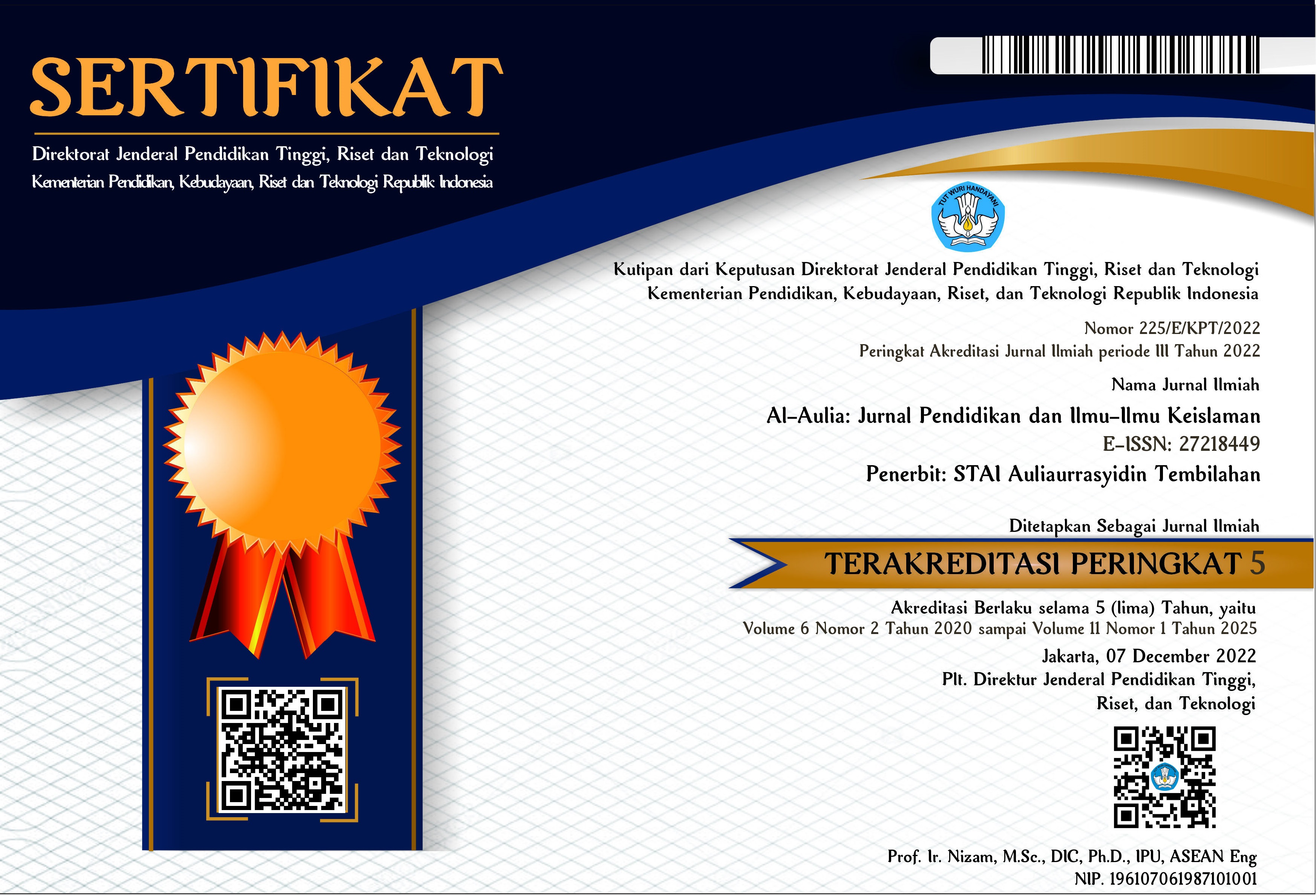Menelisik Peran Pesantren dalam Regenerasi Ulama Perempuan
DOI:
https://doi.org/10.46963/aulia.v8i2.752Keywords:
Pesantren, Regeneration, Women ClericsAbstract
In the early days of modernity entered the muslim nations of the world, namely the 19th century and the beginning of the 20th century, where the work of female clerics was not seen and recognized. This condition affects the subconscious of the world's Muslims to date, so it takes extra work to bring about the existence of female clerics and recognize their presence and authority. Islam places women as the highest symbol of spirituality by placing women's spirituality as the path to the noblest place of heaven. The breeding of females was born in a societal situation that actually insulted women. Prophet SAW brought prophetic treatises by convincing that what distinguishes women and men before Allah Almighty is the quality of their selfhood, the quality of their faith. Therefore, the birth of superstitious educational institutions for female students from the beginning is concrete evidence of the pesantren's partiality towards the mainstreaming of women. It's just that this has not supported the birth of a qualified female scholar, because the level is new at the secondary education level and the main target is to be able to equip them with the basics of women's education as prospective educators for their families and children.
References
Achmad Muchaddam Fahham, (2015). Pendidikan Pesantren; Pola Pengasuhan, Pembentukan Karakter dan Perlindungan Anak, Jakarta Pusat: Pusat Pengkajian, Pengolahan Data dan Informasi (P3DI).
Faqihuddin Abdu Kodir, (2018). Menguatkan Eksistensi dan Peran Ulama Perempuan Indonesia; (Rencana Strategis Gerakan Keulamaan Perempuan Indonesia Paska KUPI, 2018-2022). Jawa Barat: Fahmina Institute.
https://m.republika.co.id/berita/rhqsho313/ini-latar-belakang-digelarnya-kongres-ulama-perempuan-indonesia. Dikutip pada tanggal 30 Oktober 2022, pukul 21:01 WIB.
Kongres Ulama Perempuan Indonesia, (2017). Diskursus Keulamaan Perempuan Indonesia; Kumpulan Tulisan Terkait Materi Kongres Ulama Perempuan Indonesia. Jawa Barat: Panitia Kongres Ulama Perempuan Indonesia.
Mohamad Mustari, (2011). Peran Pesantren dalam Pembagunan Pendidikan Masyarakat Desa. Jakarta: MultiPress.
Rumadi, Wiwit Rizka Fathurahman, (2010). Perempuan dalam Relasi Agama dan Negara. Jakarta: Komnas Perempuan.
Satori, dkk, (2017). Liputan Media Kongres Ulama Perempuan Indonesia, (Jawa Barat: Kongres Ulama Perempuan Indonesia.
Umdatul Hasanah, (2017). Majelis Taklim Perempuan dan Perubahan Sosial Pada Masyarakat Perkotaan. Magelang: PKBM “Ngudi Ilmu”.
Downloads
Published
Issue
Section
License
Copyright (c) 2022 Fahrina Yustiasari Liriwati, Sudirman Anwar

This work is licensed under a Creative Commons Attribution-ShareAlike 4.0 International License.
Authors who publish with this journal agree to the following terms:
1. Copyright on any article is retained by the author(s).
2. The author grants the journal, right of first publication with the work simultaneously licensed under a Creative Commons Attribution License that allows others to share the work with an acknowledgment of the work’s authorship and initial publication in this journal.
3. Authors are able to enter into separate, additional contractual arrangements for the non-exclusive distribution of the journal’s published version of the work (e.g., post it to an institutional repository or publish it in a book), with an acknowledgment of its initial publication in this journal.
4. Authors are permitted and encouraged to post their work online (e.g., in institutional repositories or on their website) prior to and during the submission process, as it can lead to productive exchanges, as well as earlier and greater citation of published work.
5. The article and any associated published material is distributed under the Creative Commons Attribution-ShareAlike 4.0 International License







